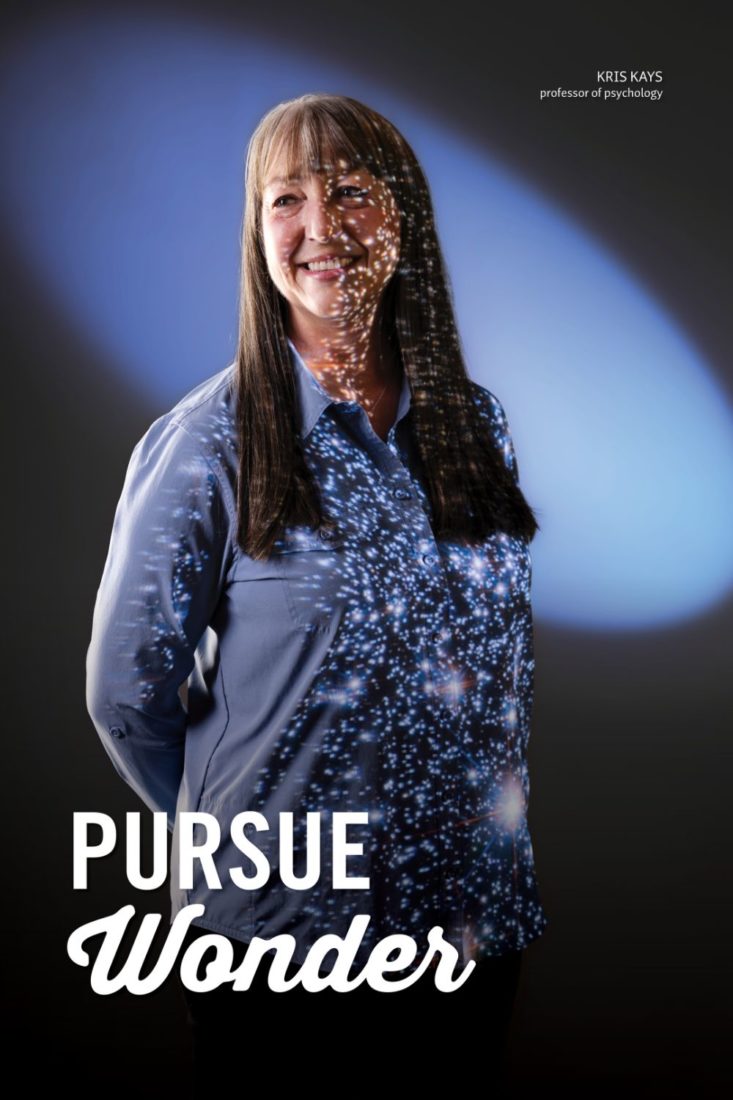The library is thrilled to announce the continuation of our “Pursue Wonder” Project, a monthly feature with scholars from across campus to see how they connect wonder and hope to their work as teachers, administrators, and educators.
Here at the George Fox Library, we’re invested in the virtue of wonder. Our collections connect us to the wonders of the world and inspire us to ask new questions every day. We hope to teach students to engage with wonder as they ask good questions and pursue truth. We also love helping researchers become better connected to the work and expertise of George Fox faculty.
This month, we’re featuring Kris Kays, Professor of Psychology. Check out her thoughts in the interview below:
What’s something that you are curious about?
I am curious about so many areas of life. I wonder about world concerns, health and wellness, and the many relationship challenges [people experience]. However, most often, I wonder how Jesus thinks about these things.
Numerous life transitions have shaped the direction of my curiosity, with an interesting emphasis over the past five years narrowing in on what influences excellence in education, what impacts experiences of imposter phenomenon, and how an individual’s identity might intersect with these components. When considering my 2019-20 sabbatical the Lord invited me to this very journey in my personal and professional life, and I am continuing to explore the dimensions and applications that can be framed within identity as imbued by the Creator.
How do wonder and curiosity connect to your life as a scholar and instructor?
I have hungered to know and ask questions since I was little. I want to understand what I can. Actually, I often want to understand what I can’t. When understanding is limited, I am learning to remain curious and ask questions so I can learn what is good for me to know and then share this with others.
Asking questions is second nature for me. I am curious about others, the world, and God. Wonder and curiosity bring life to the classroom. I have found that a learning space is enriched when each member collaborates in asking and seeking answers together. It is this co-creating through the exploration of ideas and skills which inspires me to continue learning.
As 1 Corinthians 13:12 suggests, my knowing is limited; however, when I bring wonder and curiosity to my co-learning with others (students, colleagues, etc.), my view can be expanded and enhanced. I need to bring my wonder and curiosity alongside the wonder and curiosity of others in order to continue developing. This is foundational to a passionate life.
What do you hope to learn more about in the future?
The invitation from Jesus to understand identity has become a primary focus. I see identity informing all of how life is experienced. Accurate understanding of identity can transform health, relationships, communities, and bring hope to individuals and a world desperate for such reformation. The identity of each individual involved shapes the effectiveness of teaching, learning, training, and equipping students and professionals throughout in their life journey. I want to learn how to bring hope-infused practices to my professional world in order to enhance flourishing for those of us longing for this life of fullness.
How does the pursuit of learning connect to your faith?
I was created to learn and contribute to my community. Everyone is a learner, and I believe everyone can be a teacher of what they are learning.
For me the richest experiences in conversation and classroom are found when the environment invites a courage to stretch beyond the comfortable and seek to be challenged to grow past previous understanding of self and world. This is essential to becoming who we are designed to be.
Philippians 1:6 describes a life of ongoing development and shaping. This good work is accomplished through a humble openness to learning and seeking more of “…whatever is true, whatever is honorable, whatever is just, whatever is pure, whatever is lovely, whatever is commendable, if there is any excellence, if there is anything worthy of praise, think about these things” (Philippians 4:8, ESV).
What about the things you are learning, researching, or teaching gives you hope?
I want to know how we can best apply what we learn, research and teach. Effective and beneficial application of knowledge and skill can transform hopeless situations and disheartened individuals.
Experiences of imposter phenomenon consistently impact students and professionals, undermining quality engagement in learning and professional practice. What gives me hope is the work my research team is doing in identifying strategies such as feedback training to reduce imposter phenomenon, increase accurate understanding of competency, and enhance greater clarity of identity. Tools such vital feedback are accessible and teachable, readily improving experiences for all involved.
I have hope that practical adjustments in education and training can improve both professional and personal experiences. I also believe that Jesus is all about accurate feedback and longs to provide each of us with His loving view of the children of God.
I have more than hope; I have faith that in these areas of learning research and teaching there can be greater flourishing.
